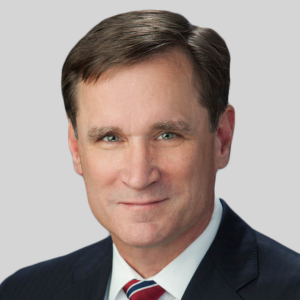According to the IEA, one in 10 people around the world lacks access to reliable energy. A third of the world’s population lacks access to clean cooking fuels—a major health risk. At some point, renewable energy sources will likely fill these gaps—but until then, Steve Riney, President and CFO of Apache, argues that we need more of every form of energy to connect people to the global economy.
As always, we want to listen to and learn from varied perspectives as part of the shift to a lower carbon economy. In this episode, Erika Pagel sits down with Steve to talk about why he thinks in terms of energy expansion rather than energy transition. They cover changes in the energy industry, conventional vs. unconventional production, energy poverty, sustainability, and “doing the right thing” in a politicized environment.
Listen and subscribe to our podcast from your mobile device:
Episode Introduction
That’s Steve Riney, the president and Chief Financial Officer of APA Corporation, the parent company of Apache Corporation – a large, multinational oil and gas company. Steve’s views on the energy industry have been informed by a career deeply embedded in all aspects of the industry. He’s worked across exploration, production, operations, finance, M&A and marketing at several corporations including Amoco, BP and now Apache. As an operator and today as an executive, Steve has an important voice to consider, as we seek to understand the future of the energy sources we rely on today, and how we’re all going to power our businesses, transportation, computers, and homes going forward.
I’m Erika Pagel, a partner and portfolio manager at Brown Advisory. As we examine the move to a lower carbon economy during this NOW series on the energy transition, I wanted to speak with someone like Steve – someone who leads a large oil and gas company – to get their perspective.
In our previous episodes in this series, we’ve spoken with – and learned a lot from – experts across the energy landscape. We’ve discussed the role of renewables, including solar and nuclear. The impact of new technologies – such as microinverters and small modular reactors. Electric vehicles. New battery technology. The critical minerals on which electric vehicle batteries depend. And what it will take to get to net zero.
The energy transition presents risks, opportunities and a lot of complexity. As investors, we believe it’s essential to examine complex issues from many perspectives – so that we can understand, as fully as possible, the context in which we’re investing our clients’ capital. Steve’s perspective, from – as he says – an unapologetic oil and gas company, provides important context in the long-term drive to a lower carbon future.
I really appreciated Steve’s views and expertise. I started by asking him to describe Apache and its business.
Guest

Stephen J. Riney
President and Chief Financial Officer, APA Corporation
Stephen J. Riney was appointed president effective Jan. 1, 2024, and chief financial officer on March 3, 2015. Prior to joining the company, he served as chief financial officer for BP Exploration and Production from July 2012 to January 2015, and global head of mergers and acquisitions for BP plc from January 2007 to June 2012. Mr. Riney holds a Master of Business Administration from The University of Chicago Booth School of Business and a bachelor’s degree in accounting and finance from the University of Notre Dame.
Host

Erika Pagel
Co-CIO, Private Client, Endowments and Foundations, Brown Advisory
Erika is a partner, a member of the Executive Team, and serves as a portfolio manager and as the co-chief investment officer of private client, endowments and foundations. Erika has worked in the investment management industry since 1996. Prior to Brown Advisory, she was an investment advisor at Silver Bridge Advisors. Erika started her career at MFS Investment Management before working in sell-side Equity Research for eight years following large cap pharmaceuticals, household products, consumer and retail sectors at Schroder & Co and then UBS Investment Bank. More recently, she was an analyst following consumer and retail companies at a hedge fund, Balyasny Asset Management. For more than 12 years, Erika’s has been researching investment options for sustainable investment managers and helping clients build portfolios that are aligned with their goals.
Listen Next
The Energy Transition: The Essential Role of Lithium
S4 | Episode 5 | December 5, 2023
Lithium is the lightest metal, so soft that you can cut it with a knife. Its structure gives it the ability to store large amounts of energy, making it ideal for manufacturing batteries. As the world moves to create a lower-carbon economy, the energy transition may well hinge on lithium. To learn more about lithium and its role in electrification and the shift to renewable energy sources, Brown Advisory's Erika Pagel sits down with Eric Norris, President of Energy Storage at Albemarle—the largest producer of lithium in the world.
